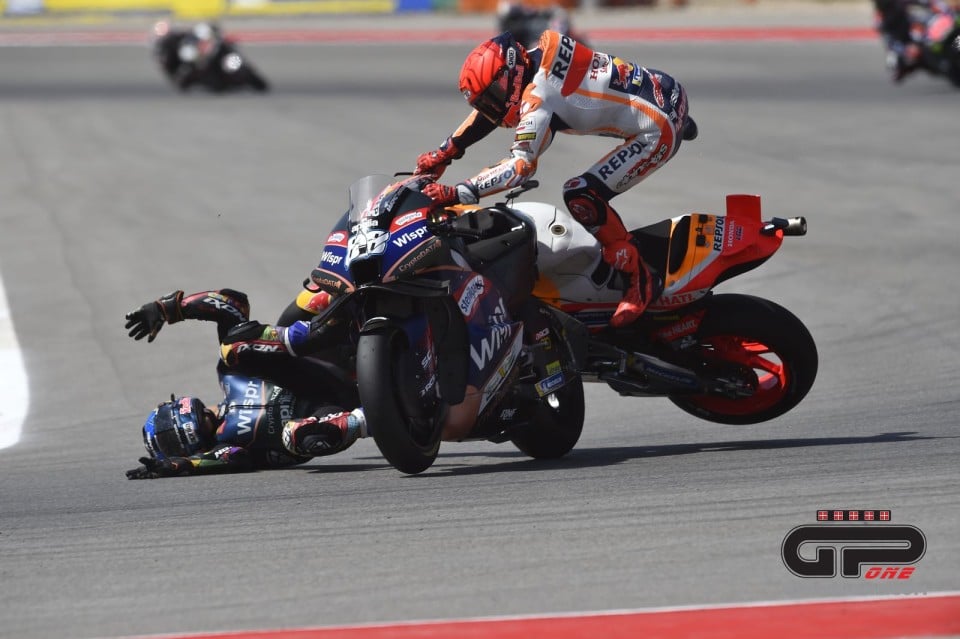Let's make it short: the FIM Court of Appeal has decided NOT TO DECIDE and has SUSPENDED the application of the penalty, the double long lap inflicted on Marc Marquez for irresponsible riding. The problem, the modification of the original penalty paid in Portugal, double long lap in Argentina, then modified in 'next Grand Prix' does not respect the principles of law. In fact, it was yet another mess made by the Stewards completely and guiltily lacking in legal knowledge.
In a nutshell these are the facts:
On 26 March 2023, in the MotoGP Race of the Grande Premio Tissot de Portugal, the FIM MotoGP Stewards Panel imposed a Double Long Lap Penalty on Mr Marc Marquez, Rider #93. On 28 March 2023, the same FIM MotoGP Stewards Panel notified the Application of the Sanction imposed on the rider to clarify the scope of its applicability.
Following the appeal from the rider and the HRC - Repsol Honda Team against the Application of the Sanction, the FIM Appeal Stewards decided to refer the case to the MotoGP Court of Appeal on 29 March 2023.
As a result, the MotoGP Court of Appeal ruled on the request to stay the execution of the Application of the Sanction submitted by the Appellants.
A decision granting the stay of execution of the Application of the Sanction was rendered on 12 April 2023 and notified the same day to the Appellants. A final decision on the appeal will be rendered in due course.
The result, motivated by the FIM Court of Appeal and signed by Sakari Vuorensola, is as follows. And excuse us if we have condensed the first part of this (first) sentence:
In support of the request for the provisional stay, the Appellants (i.e. the Repsol-Honda team) submit that a prima facie analysis of the merits of the case shows that there is a reasonable chance of success for the appeal (‘likelihood of success test’). Furthermore, the Appellants submit that the stay of execution is useful and indispensable for protecting the rights of the Rider from irreparable harm in the 2023 Grand Prix World Championship, and finally that the interest of the Rider as to the irreparable harm outweighs the interest of the FIM in this case.
As regards the chance of success, the Appellants argue that by the Application of the Sanction the FIM MotoGP Stewards Panel unilaterally and ex post facto amends the Original Sanction imposed on 26 March 2023. This infringes the right of the Rider to a due process as well as the principle of legal certainty, since the Original Sanction was not appealed and, therefore, became final.
As regards the irreparable harm for the Rider, the Appellants argue that if the Rider had to complete the two Long Lap Penalties in the following MotoGP Race in which he will be able to compete, this would inevitably and irremediably have a direct impact on the Rider’s timing and championship standing in said race as well as the Team’s and Rider’s position in the 2023 Grand Prix World Championship.
In accordance with the Appellants’ reasoning, such irreparable harm for the Rider and the Team outweighs the interest of the FIM in maintaining the statu quo.
This Court considers that it may, in accordance with Article 3.4.5, decide by injunction on the provisional stay of the execution of the Application of the Sanction, if it is established that such stay is justified, prima facie, in fact and in law (fumus boni juris) and that the interests of the Rider and those of the Team, in order to avoid irreparable harm, outweighs the interest of maintaining the statu quo.
Reasonable chance of success (prima facie)
As regards the condition relating to the establishment of a prima facie case, the Court is satisfied if at least one of the justifications relied on by the Appellants in support of the claims on the merits of the case does not appear, prime facie, unfounded. This is the case, inter alia, where one of the justifications reveals the existence of complex legal issues for which a solution is not immediately obvious.
In the present case, the Court notes that already the FIM Appeal Stewards, in their decision dated 29 March 2023, have considered the circumstances of the case as well as the legal issues raised by the Appellants as valid reasons justifying their decision to refer the case to the MotoGP Court of Appeal. This is an indication revealing the complexity of the legal issues for which no immediate and obvious solution was available for the resolution of the case at hand.
To establish the existence of a prima facie chance of success, the Appellants rely on the fact that the Original Sanction was not appealed and, therefore, became final (res judicata). Thereafter, the Original Sanction shall no longer be challenged by the Rider nor revised or modified by the FIM MotoGP Stewards Panel. Therefore, the “clarification” of the Original Sanction (i.e. the Application of the Sanction) infringes the principle of legal certainty because it modifies the Original Sanction.
As regards the condition relating to the establishment of the interests of the Appellants to avoid irreparable harm, the Court considers that it is for the Appellants to prove that they cannot wait for the outcome of the main proceedings without suffering damage of serious and irreparable nature. To establish the existence of serious and irreparable damage, it is not necessary for the occurrence of the damage to be demonstrated with absolute certainty. It is sufficient that it be foreseeable with a sufficient degree of probability.
In the present case the Court notes the Appellants’ assertion that the consequence of completing the Double Long Lap Penalty in the next MotoGP Race would impact the Rider’s ability, for example, to outrun other riders and thus his position in the race standings. Such consequences cannot be undone if the Court subsequently rules on the merits of the case in favour of the Appellants.
Therefore, it must be concluded that the requirement that a serious and irreparable harm be established has been satisfied in the present case.
Balance of interests
As regards the weighing up of the interests and risks attached to each of the possible solutions, the Court considers that this involves examining whether the interests of the Appellants in the stay of execution of the Application of the Sanction outweighs the interest of maintaining the statu quo.
In the present case, the Court notes that should it, later in the main proceedings on the merits of the case, decide to reject the appeal of the Appellants, it still has an option to order the Rider to serve the Double Long Lap Penalty in any of the forthcoming MotoGP Races throughout the 2023 season.
Furthermore, the Court is also aware of the fact that Article 1.19.2 foresees an alternative solution for cases where a Long Lap Penalty cannot be carried out before the end of the race or where the race is interrupted prior to the completion of the Long Lap Penalty. In such cases, an equivalent time penalty will be inflicted to the rider concerned. The Court could use this provision of the Regulations by analogy and, thereby, provide an alternative solution for this case.
In those circumstances, it must be concluded that the balance of interests leans in favour of granting the stay of execution as requested by the Appellants
On these grounds, the MotoGP Court of Appeal rules that the execution of the FIM MotoGP Stewards Panel Notification of 28 March 2023 related to the Application of the Sanction imposed on Mr Marc Marquez issued in connection with the previous Notification of Sanction by the same FIM MotoGP Stewards Panel of 26 March 2023 is ordered to stay until the appeal submitted by Mr Marc Marquez and the HRC - Repsol Honda Team is finally resolved.









